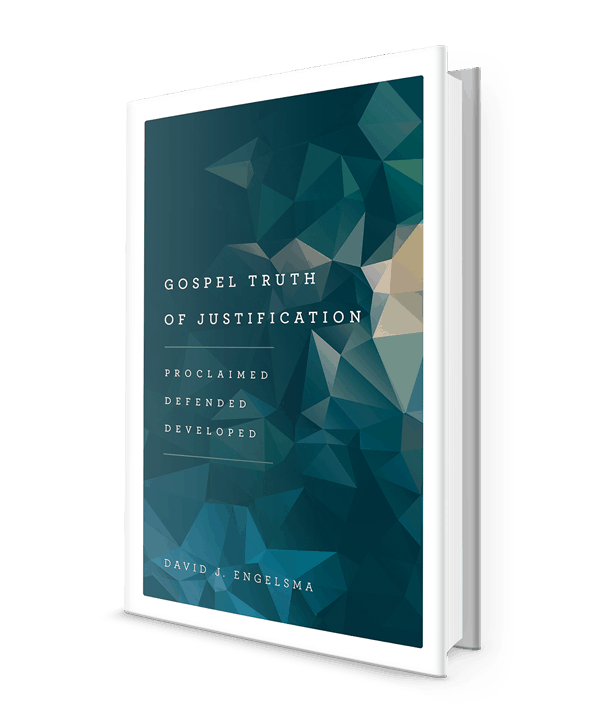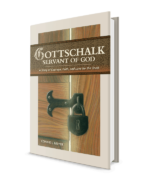AD 2017 marks the five-hundredth anniversary of the Reformation of the church of Jesus Christ. In 1517 the Reformer Martin Luther affixed the ninety-five theses to the door of the church in Wittenberg, Germany, the act by which Jesus Christ began His reformation of his church. Essential to this Reformation was the gospel-truth of justification by faith alone.
The book is a thorough explanation of the divine, saving act of justification and a vigorous defence of the doctrine, not only against the old heresies of Rome and of Arminianism, but also against the contemporary attacks on justification by the New Perspective on Paul, Evangelicals and Catholics Together, and the Federal Vision.
Originally conceived by the author as a polemical work against the modern attacks on, and departures from, the truth of justification, the book became instead a thorough, systematic and largely positive treatment of the doctrine. Instead of contending with the theologians, it instructs Reformed and Presbyterian believers, including perhaps some ministers, in the truth that is the heart of the gospel and that, therefore, bears on all the other truths of the gospel. The book explains justification as imputation; that justification is by faith; the essential importance of justification’s being by faith “only;” the meaning of justification’s being “by the faith of Jesus;” the assurance of faith, with particular reference to the error of much of Puritanism; the “when” of justification, including a careful, moderate and biblical defence of eternal justification; the origin of justification in the counsel of the covenant; the merit of Christ’s active obedience; the still controversial relation of Paul and James; the necessary relation of justification and election; and more.
The book is permeated with biblical exposition and the doctrine is founded upon Scripture. Although not mainly polemical, the book throughout defends justification by faith alone, especially against contemporary false doctrines and teachers. It names names. This alone makes the book worthwhile. For the present-day Reformed churches and theologians, facing an assault on the gospel truth of justification that threatens and undoes everything that the Reformation confessed and for which the Reformers contended, either fall into a cowardly silence or subtly compromise the fundamental gospel truth. Thus, there is a great falling away (unto perdition)—not of the “liberal” Protestant churches, which became apostate long ago and are ready, if not eager, to fall into the embrace of Rome—but of the Reformed and Presbyterian churches that still have a reputation of “conservative” and orthodox.
Nevertheless, the book is more than a contemporary defence of justification against modern heresies and heretics, including the New Perspective on Paul, the Federal Vision, N. T. Wright and Norman Shepherd. It is also more than only a historical commemoration of the sixteenth-century Reformation’s stand on behalf of the truth of justification by faith alone. These two features alone would make the book timely.
In two respects the book can justly, if audaciously, claim to be a development of the doctrine that was the heart of the Reformation. First, contemporary heresies have occasioned development of the doctrine, for example, the ultimate grounding of justification in the counsel of the covenant. Second, the book is a systematic, thorough, concentrated treatment of justification. The Reformers worked the truth of justification into their commentaries, theological treatises on various subjects and polemical works. They did not, so far as I am aware, produce a work devoted strictly to justification in a systematic, concentrated, thorough treatment of the doctrine.
The RFPA contributes to the commemoration of the Reformation, therefore, not only by remembering the gospel truth of justification, but also by explaining the doctrine to a new, much later generation of Protestant believers, by defending it against contemporary foes and by developing it further.
At such a time as this, a work that echoes Luther’s “here I stand” with specific regard to the fundamental doctrine of the Reformation is not only appropriate, but necessary. Clearly, unequivocally, creedally, biblically, the gospel truth of justification by faith alone, without works—any works, all works! Only the alien, perfect work of the Son of God in our flesh, Jesus the justifying Christ of God! Received by faith alone! Luther—to whose memory the book is dedicated—would be glad.
“… so thrilled with this last book. I’d like to order three more copies to give to the staff members at my church.” – USA
“What a pleasure to read so many things from so many angles about the utter sufficiency and power of Christ and His righteousness to freely justify us through faith! Engelsma states ‘justification is a perfect act of salvation,’ with us receiving a ‘perfectly accomplished verdict’ (p. 449). In Christ we are right with God forever, as safe and justified now as we ever will be! Also the book is so helpful in understanding how the wrong teachings of the federal vision and the new perspectives on Paul are perpetuated through both subtlety and outright misinterpretation of scripture, causing Engelsma to say: ‘the federal vision is as ignorant of the law as it is of the gospel’ (p. 488). But this [is] a book to make us see we are co-heirs with Christ and have a right to all his blessings only for the sake of His righteousness.” – Pennsylvania, USA
“This is a great book! I bought a bunch to use … for a class or as gifts!”
For an excerpt of this book in Hungarian, click here.
To read this book in Polish, click here.
Book Review by Rev. John Marcus.
Who would have thought that the gospel truth of justification by faith alone would be under attack today in churches that have their heritage in the Protestant Reformation? Yet Engelsma makes plain that such is exactly the case, even as we celebrate the five-hundredth anniversary of the Reformation. The current controversy concerning justification is so critical to the gospel that we do well to learn to defend the truth against the lie that spreads itself throughout the church world.
Anyone who is intimidated by the word justification in the title of this book and has the notion that such a book must belong only in seminaries and pastors’ studies is sorely mistaken. This book belongs not only in the homes of those who care for the truth of the gospel, but also in their hands as they read every page. It belongs in the hands of members of faithful churches as a means by which God may protect the church. It belongs as well in the hands of members of churches that have not faithfully maintained the truth, so that they might begin once again to stand for the truth. And it belongs in the hands of those who have wavered concerning the truth of justification, so that they might learn the truth and repent of any errors they have held.
Gospel Truth of Justification is a sound and helpful exposition of the basic truth of justification by faith alone. The author covers the truth of justification from multiple angles, so that by the time one is finished with the book, he or she should have a thorough knowledge concerning justification, the “main hinge upon which religion turns” (as Calvin called the truth of justification). Engelsma quotes the Reformed and Presbyterian creeds to demonstrate the definition of justification as “God’s pardon of the guilty sinner—the forgiveness of sins—delivering the sinner from eternal damnation. It is also the gift to the sinner of a righteousness that makes the sinner worthy of eternal life and glory.” He shows that the creeds and scripture clearly teach that justification is 1) by imputation, not by infusion of righteousness; 2) a legal act that changes the sinner’s legal standing before God; 3) by faith alone apart from the good works that proceed from faith; 4) not based on faith itself as an act that substitutes for good works; and 5) based “wholly and exclusively [on] the righteousness of Jesus Christ.”
The book is especially valuable because it exposes the errors of ancient and modern heretics alike. One of the strengths of Engelsma’s work is that he helps the reader see errors hidden in the words of the most smooth-talking heretics. For the benefit of rooting out error and warning God’s people, he is not afraid to name names. In characteristic fashion he takes aim at various errorists, showing what they teach and then demolishing their arguments one by one. He deals with the related errors of the Roman Catholic Church; the Arminian heresy; the heresy of federal vision, which is rooted in the doctrine of a conditional covenant; and the new perspective on Paul, all of which deny justification by faith alone apart from works.
Lastly, the book is valuable for Engelsma’s development of the doctrine of justification as he unfolds the truth to reveal more of its beauty to sinners saved by grace. Some helpful topics discussed are assurance of justification; when justification takes place, including a discussion of eternal justification; the place of Christ’s active obedience in justification; the reward of good works; the harmony between the inspired apostles Paul and James in Romans and James, respectively; the tight connection between election and justification; and the relationship of justification to the final judgment.
This book deserves to be widely read and discussed. A hearty thanks to the author for his defense of the gospel truth. Above all, thanks be to God for his unspeakable gift.









